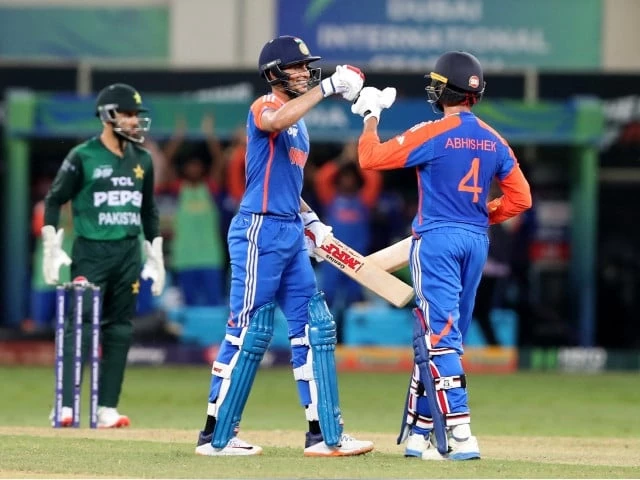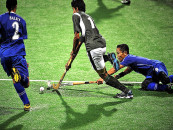‘Breach of Spirit’ - Tharoor slams India’s handshake snub to Pakistan
All eyes on Sunday’s Asia Cup final handshake, with gesture overshadowing game

Congress MP Shashi Tharoor has criticised the Indian cricket team for refusing to shake hands with Pakistani players during recent Asia Cup matches, calling it a breach of cricket’s spirit.
“Once the decision was made so strongly by Pakistan, we should have played in the spirit of the game and we should have shaken hands, done the normal things that were required,” Tharoor told Asian News International.
He recalled the 1999 World Cup in Manchester, played at the height of the Kargil conflict. “On the very day when soldiers were dying for our country, we were playing the World Cup in England. What we were doing, frankly, was shaking hands, because the spirit of the game is a different spirit from what was on between countries, between armies and so on.”
Read: India, Pakistan set for first Asia Cup final encounter
Tharoor added that while Pakistan later retaliated by refusing handshakes, India should not have set the precedent. “If the Pakistani team, having been insulted the first time, decides to insult us back the second time, it shows the spirit of the game is lacking on both sides. But certainly, we may not have initiated it. Once we have decided to play, we should have played normally.”
How the row began
The controversy started on September 14 in Dubai when India defeated Pakistan by seven wickets in the Asia Cup group stage. After the match, India’s players walked straight off without the customary handshake, leaving Pakistan’s Salman Agha and his team waiting on the field.
Coach Mike Hesson expressed disappointment, saying his side was ready to shake hands but “our opposition did not do that… That was a disappointing way for the match to finish.” Pakistan Cricket Board (PCB) chairman Mohsin Naqvi condemned the action as “utterly disappointing” and “against the spirit of sportsmanship”.
A day earlier, at the captains’ press conference, Suryakumar Yadav and Agha had emphasised “respect and intensity.”
Both shook hands at the end, and Yadav shook hands with Naqvi, though Indian media criticism foreshadowed the silence on the field.
Captain Suryakumar Yadav handshake with Pakistan's interior minister Mohsin Naqvi who recently given India a threat after Operation Sindoor.
— Rajiv (@Rajiv1841) September 9, 2025
I don't know how these people see their faces in mirror. They kill our innocent people & here we are handshaking with them. Shameful!! pic.twitter.com/QXZCHpMmcb
Tensions escalated in the Super Four match on September 21, Indian captain Suryakumar Yadav again refused a handshake at the toss. The Pakistan Cricket Board protested to the International Cricket Council (ICC), claiming referee Andy Pycroft had advised Agha not to approach Yadav.
Pycroft said he had received instructions just minutes earlier from the Asian Cricket Council (ACC) after the Board of Control for Cricket in India (BCCI) raised the issue. The ACC had advised avoiding handshakes due to political sensitivities. ICC confirmed Pycroft did not formally apologise. The row delayed Pakistan’s next game against the UAE amid debate over Pycroft’s role.
International Cricket Council (ICC) rejected calls for his removal. ICC later fined Yadav and Pakistan’s Haris Rauf 30% of match fees—Yadav for military-related comments, Rauf for a “6-0” hand gesture.
Haris Rauf never disappoints, specially with 6-0. pic.twitter.com/vsfKKt1SPZ
— Ihtisham Ul Haq (@iihtishamm) September 21, 2025
Sahibzada Farhan received a warning after mimicking a gunshot. Sanctions were imposed by ICC match referee Richie Richardson after formal complaints from both boards.
War backdrop
The tension followed a brief but fierce conflict between the two countries. In April, the Pahalgam terror attack killed 26 Indian tourists. Delhi blamed Islamabad without presenting evidence and launched “Operation Sindoor” with missile strikes inside Pakistan.
Pakistan retaliated with attacks on Indian military facilities. The fighting lasted four days and left more than 70 dead before a ceasefire took hold.
Read more: Pakistan secure Asia Cup final spot against India with 11-run win over Bangladesh
When the Asia Cup began months later, political tensions carried into the field.
Indian captain Yadav openly linked the refusal to shake hands with the memory of Pahalgam’s victims, saying: “A few things in life are above sportsmanship. We stand with all the victims… and dedicate this win to our brave armed forces.”
India’s diplomatic push
Tharoor’s comments carry weight because he was also central to India’s diplomatic campaign after the war. He led a ten-member all-party delegation to Washington to brief US officials on the Pahalgam attack and Operation Sindoor. The delegation’s agenda was to secure international support for India’s stance that Pakistan-backed militants orchestrated the attack.
Also read: Pakistan did not request ceasefire, says FM Dar
Parallel delegations fanned out to other regions: Salman Khurshid to East Asia, Supriya Sule to Europe, Kanimozhi to Russia, Ghulam Nabi Azad to the UK and EU, and RS Prasad to West Asia.
Each group was tasked with lobbying foreign governments and explaining India’s post-war position.
Spirit of the game, lost in politics
The absence of a handshake soon overshadowed the cricket itself. Former Pakistan captain Shahid Afridi said Indian players were “just following orders from above,” while Shoaib Akhtar urged politics to be kept out of the game. Ex-umpire Anil Chaudhary dismissed Pakistan’s outrage as “unnecessary drama”.
Younis Khan, Pakistan’s record Test run-scorer, called on his team to “win the final and then offer a handshake to Indian players”, while also accusing India of damaging the “gentleman’s game”.
Younis Khan said, "Indian players not shaking hands is against sportsmanship. But they are following their government's instructions. Still, even if they don't, Pakistan should win and extend your hand". pic.twitter.com/zyb8Mvy142
— Salman. (@TsMeSalman) September 25, 2025
Traditionally, captains shake hands at the toss and players at the end of a match. Though not mandated in ICC rules, it remains a powerful symbol of respect. India’s decision to abandon the gesture has turned it into a statement of defiance for India, an insult for Pakistan and a reminder of how politics can consume sport.
Stalemate continues
Cricketing ties between Pakistan and India have been frozen since 2012, with bilateral series suspended. Even in multi-national tournaments, the smallest gestures now carry heavy political meaning.
With the Asia Cup final set for Sunday, all eyes are on the ritual handshake rather than the scoreboard.
Why would the handshake happen now? That'll be a different match, different occasion. This moment passed



















COMMENTS
Comments are moderated and generally will be posted if they are on-topic and not abusive.
For more information, please see our Comments FAQ